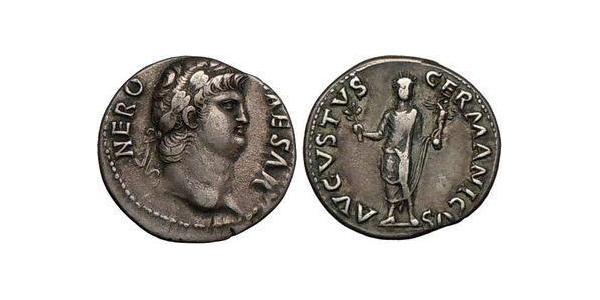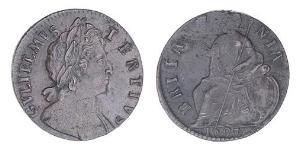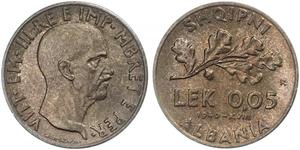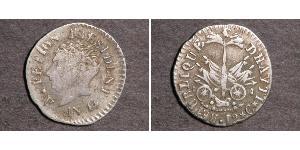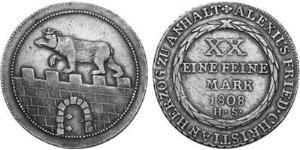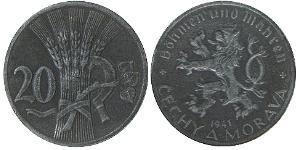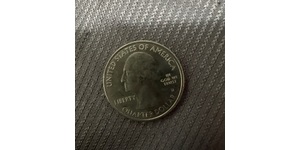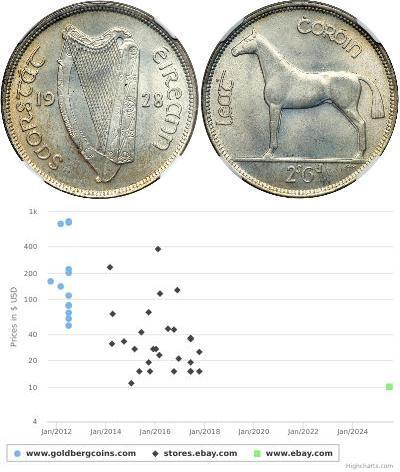[ 2779] NERO, 54-68 A.D. Silver denarius (19mm, 3.32 gm). Rome, 64-65A.D. NERO CAESAR, Laureate head of Nero right . AVGVSTVS GERMANICVS, Nero, as Helios, radiate and togate, standing facing, holding branch and Victory on globe. Reference: RIC 47. RSC 45. Provided with certificate of authenticity. CERTIFIED AUTHENTIC by Sergey Nechayev, PhD - Numismatic Expert Nero Claudius Caesar Augustus Germanicus (15 December AD 37–9 June AD 68), born Lucius Domitius Ahenobarbus, also called Nero Claudius Caesar Drusus Germanicus, was the fifth and last Roman emperor of the Julio-Claudian dynasty. Nero was adopted by his great uncle Claudius to become heir to the throne. As Nero Claudius Caesar Augustus Germanicus, he succeeded to the throne on 13 October 54, following Claudius's death. One of ancient history's most infamous characters, Nero rose to power in his mid-teens following the death of Claudius, his adoptive father. To speed things along he had Britannicus poisoned and in league with his mother Agrippina had had Claudius poisoned as well. His next few years were fairly unremarkable one way or the other largely in part because of Agrippina's overbearing influence. He corrected the problem, however, by having her executed on the pretext that she had a unfavorable view of Poppaea, his new mistress. Because he was already married to a certain Octavia he had her exiled and murdered as well. He would later kick Poppaea to death while she was pregnant. To round things out he had his teacher Seneca, another influential man of his age, commit suicide on suspicions of him and others plotting against him. Popular legend holds that he set fire to Rome. Modern historians dismiss this account as an exaggeration but his decision to hold a poetry recital with the conflagration as his background was a crass political blunder that would hurt his popularity immensely. Needing to find a scapegoat, he chose to point the finger at Christians who up until then had been but a fledgling cult. For the next 300 years Christians would be vilified for every ailment within the empire and used regularly as cannon fodder in the Coliseum. In one of the more bizarre spectacles imaginable, Nero would set Christians on fire and held in position to act as torches during his parties. Becoming ever more hated for his cruelty and the demoralizing effect of the execution of countless innocent individuals, one by one far-flung provinces seceded and named emperors among their own. When Nero was unable to deal with the insurgencies he lost hope and fled to the countryside. The Senate then issued a warrant for his arrest and, on hearing of this, decided to commit suicide... but not before asking one of his slaves to commit suicide first just to see what it would be like! Nero ruled from 54 to 68, focusing much of his attention on diplomacy, trade, and increasing the cultural capital of the empire. He ordered the building of theaters and promoted athletic games. His reign included a successful war and negotiated peace with the Parthian Empire (58–63), the suppression of the British revolt (60–61) and improving relations with Greece. The First Roman-Jewish War (66–70) started during his reign. In 68 a military coup drove Nero from the throne. Facing assassination, he committed suicide on 9 June 68. Nero's rule is often associated with tyranny and extravagance. He is known for a number of executions, including those of his mother and step-brother, as the emperor who "fiddled while Rome burned", and as an early persecutor of Christians. This view is based upon the main surviving sources for Nero's reign—Tacitus, Suetonius and Cassius Dio. Few surviving sources paint Nero in a favorable light. Some sources, though, including those mentioned above, portray him as an emperor who was popular with the common Roman people, especially in the East. The study of Nero is problematic as some modern historians question the reliability of ancient sources when r ...
читати далі

|
Добавив:
anonymous 2015-08-19 |
Similar Coin Groups
2025-06-18
- Покращення Живого Каталогу Монет / загрузка монет
536 монет було додано з 2025-06-11 по 2025-06-18
Одна з них:
2025-06-14
- Історичні ціни на монету
Можливо, Вас зацікавить...

